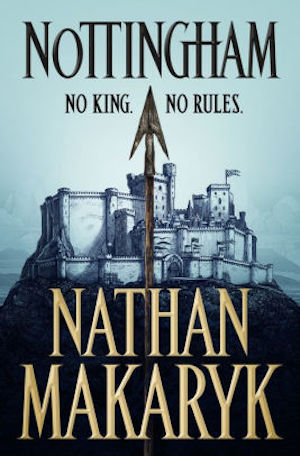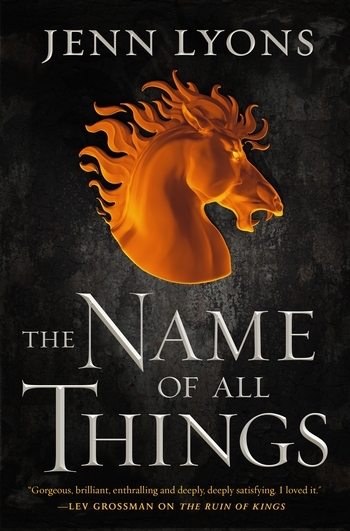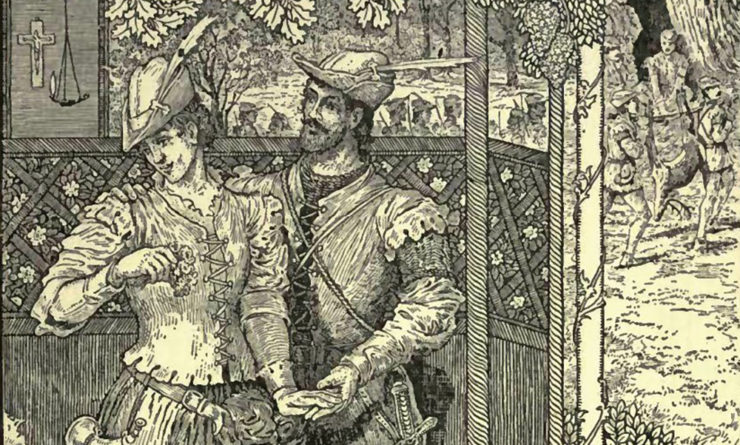There are some stories we just keep coming back to: myths of great heroes, of Chosen Ones who save the world, of sources of light that lead us from the dark. These stories as passed down through generation and take many forms: some are told many times with slight changes to suit the times, some are changed to make the hero look more like the storyteller. Some become songs or plays or films. But no matter the shape these stories take, their core themes stay the same, and we relate to them over and over again.
The first whispers of Robin Hood began to show up in the 15th century, in epic poems and ballads. They tell of his skill as an archer, the band of Merry Men, and paint him as an advocate for the lower classes – a hero of the people. Robin Hood, in all his forms, is a man who uses his skills to correct what he sees as a great wrong – the exploitation of the people of England. And maybe this is why we keep coming back to the Robin Hood myth—he’s a hero who is one of us.
In Nathan Makaryk’s novel Nottingham, Robin is a soldier running from his past, whose life becomes intertwined with others who are subverting the tyranny of Nottingham. The Name of All Things by Jenn Lyons flips the Robin Hood myth on its head—placing the arrow-toting hero in a fantasy world with dragons, wizards, and demons.
Jenn Lyons and Nathan Makaryk sat down together to talk all things Robin Hood—from myth to adaptation.
The obvious question: Favorite Robin Hood? Can be a movie, TV show, etc.
JENN LYONS: Titles of Robin Hood movies are always such a problem. My favorite is…ready? Robin Hood. Yeah. Helpful. I’m talking about the Patrick Bergin version of that name which went straight to TV because it had the bad luck to be in production at the same time as Kevin Costner’s Prince of Thieves. That said, I’m also fascinated by the 1938 Errol Flynn movie. It dives right in: no time spent on backstory the audience already knows—let’s get to the fencing!
NATHAN MAKARYK: I’m also a fan of a simply-titled Robin Hood, though I’m one of the rare ones who enjoyed the Scott/Crowe movie from 2010. It got a lot of hate, but I really enjoyed the more realistic tone of it … and it gave me a lot of inspiration for my novel, both the parts that worked and the parts that didn’t.
What’s a favorite non-Robin-Hood Robin Hood? I.e., Something that isn’t a Robin Hood entity, but in which you see a lot of Robin Hood inspiration?
NM: No contest for me, the character of Beric Dondarrion and the brotherhood without banners, from A Song of Ice and Fire. Sometimes good guys, sometimes bad guys, I think he’s a pretty realistic depiction of what an outlaw gang would really be like. Including the fact that you’d probably get killed a lot.
JL: I’m tempted to say Leverage but…wait. I’m sticking with Leverage. I have a lot of favorites, but that’s the one I’ll go back and rewatch forever.
What’s something about the Robin Hood story that most people either don’t know or get wrong?
JL: Most people don’t realize a lot of how we imagine Robin Hood comes from the novel Ivanhoe. Stories of Robin Hood as outlaw go back to the middle ages, but Robin of Locksley, knight returned from the Crusades, who takes up the fight against oppressed Saxons until King Richard returns? We can thank Sir Walter Scott for that—early filmmakers lifted Ivanhoe’s entire backstory and gave it to Robin Hood, who’s kept it ever since.
NM: Yes—I’ll just expand on that. Everything we think we know about Robin Hood is an amalgam of so many different versions over the centuries. There’s no singular “correct” story, and there’s almost certainly no “actual” Robin Hood who could ever possibly satisfy all of the legends. Following the history you can pinpoint the centuries when Maid Marion and Friar Tuck were added to the ballads, even though we think of them as integral now.
Buy the Book


Nottingham
What’s your biggest Robin Hood pet peeve?
NM: I HAVE SO MANY. You better go first or I’ll take them all.
JL: Oh, easy. Maid Marion used as score-card, not good for much else than to be placed in danger, rescued, placed back in danger, repeat ad nauseam. Honestly, that’s one of the reasons I’m so excited about your book Nottingham. Because your depiction of Marion is so…not that. Not that at all.
NM: Agreed, and I’ll add that I also hate that she’s also usually the only female involved. I did everything I could to add more women to the story who were more than just damsels-in-distress. Biggest pet peeve after that is the whole good guy/bad guy thing. I hate the moustache-twirling Sheriff who is insanely evil, and I hate the idea that these Merry Men are completely altruistic and not in it for themselves.
Speaking of inspiration, do you see yourself using any Robin Hood character themes or tropes in your writing?
JL: I’ll be the last person to deny that Robin Hood themes had a major influence on The Name of All Things. It’s not subtle—the book features a gender-flipped archer and her band of outlaws fighting back against noble tyranny, after all.
NM: Well my book is obviously all Robin Hood, but a lot of what I set out to do was break those tropes and dissect them, so my inspiration comes from holding them up to the light and pointing out the flaws.
We usually think of Robin Hood as a member of the aristocracy, but the earliest Robin Hood takes depicted both him and his Merry Men as yeoman—what we might consider middle class. Why do you think that changed and how has it affected the myth?
JL: I think it changed when the audience changed. At some point, Robin Hood stopped being a figure of May Day celebrations and became a subject for performances before the elite—and when that happened, he became one of the elite as well.
NM:Well there’s a gravestone in Kirklees Priory that theoretically names the Earl of Huntingdon as Robin Hood in 1247, but there’s debate on that too. I think part of the fun is that there are so many possibilities as to who he could have been, which is part of what makes him so accessible. Anyone can be Robin Hood.
Villains in Robin Hood are weirdly malleable. Depending on the version, we may see Prince John, the Sheriff of Nottingham, and/or Sir Guy of Gisborne, in various combinations. Why is that?
JL: Honestly I think it’s because they’re not as important. And I say that as someone who really likes Sir Guy of Gisbourne. The villains can change, but as long as the basic premise remains—congratulations, it’s a Robin Hood story.
NM: Yeah, I think it largely depends on the scope of the story being told. If it’s a smaller story: Gisbourne. Larger? The Sheriff. Are we taking on country-wide politics? Then Prince John! It goes back to the flexibility of Robin Hood, and the idea that the “everyman” is needed against all levels of injustice.
What “works” in a Robin Hood story today? Is it the same thing that worked fifty years ago?
NM: I think that the things we expect from modern storytelling has evolved so much, especially in the last twenty years. Stories are more complex now, with more shades of gray, and I don’t think an Errol Flynn Robin Hood would work anymore. Robin Hood has every potential to be used as a mirror to our times, and I think it’s most successful when the aspects explored are relevant, thematically at least.
JL: Oh I totally agree, but while I don’t want to see a pure re-do of Errol Flynn’s Robin Hood, I wouldn’t mind seeing Errol Flynn’s take on Robin Hood in a modern retelling. Now there was an arrogant bastard! By modern standards, I think he would be a flawed, interesting character.
Buy the Book


The Name of All Things
Any other way the story has evolved over the generations, and why?
JL: I think the biggest change is that we want to know the backstory. That’s reasonably recent 20th century stuff. Now we want to know how Robin Hood ended up in a forest robbing passing nobles. Prior to that who Robin Hood was didn’t seem to be nearly as important as what Robin Hood was doing.
NM: That very much ties into the modern trend of realism, even in fantasy stories. We want to understand why, and we’re quick to call out things that don’t make sense. It’s sort of a universal skepticism, which I enjoy. You want me to believe in a thief giving out all his coin? Then you better explain it to me.
Anywhere you want to see Robin Hood go in the future? How do you think he’ll continue to evolve?
JL: I’d like to see more stories where we deviate from the ‘only a noble can save us from the other nobles’ themes of later Robin Hood stories. And while I don’t think we could stop Robin Hood stories from evolving if we tried, I’d love it if Hollywood would stop trying to edgelord up Robin Hood.
NM: Agreed—he’s not a superhero, and I think the takes that try to turn him into one are setting themselves up for failure. I guess I better get a shameless plug in, because my book Nottingham is exactly where I want to see Robin Hood going. Morally grey, no clear lines between good guys and bad guys, and a more compelling (and personal) relationship between Robin and the Sheriff. I want to see a human Robin Hood …and humans, if you’ve ever met one, are full of flaws.
Nathan Makaryk’s Nottingham is available now from Forge Books.
Jenn Lyons’ The Name of All Things publishes October 29th with Tor Books.










